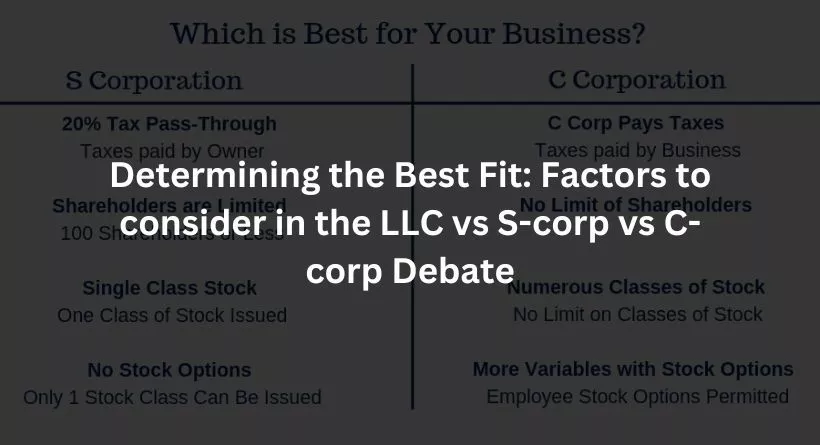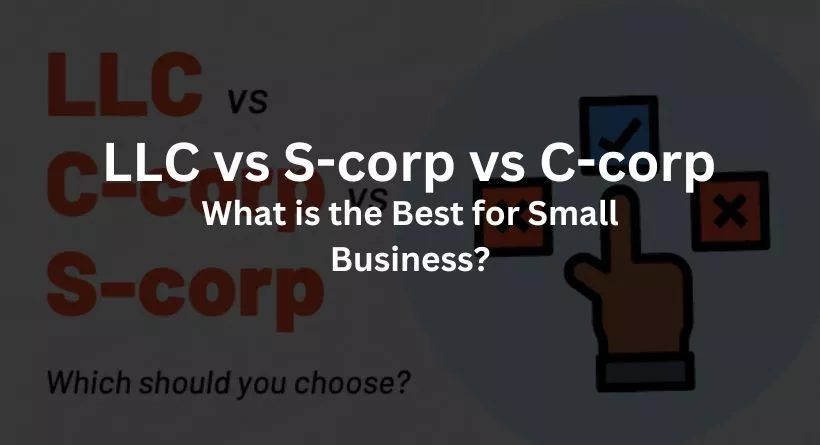Starting a small business? You’re not alone. But there’s one question that’s probably keeping you up at night: “Should I form an LLC, an S-corp, or a C-corp?” It’s a common conundrum, and believe me, we’ve been there too. But don’t let this question keep you stalled, because in this blog post, we’re going to help you navigate the maze of LLC vs S-corp vs C-corp.
Yes, it’s true; the decision can seem daunting. There are numerous factors to consider, including tax implications, personal liability, and the ease of operation. But here’s our promise to you: By the end of this post, you’ll have a clear understanding of each entity’s pros and cons, helping you make an informed decision that best fits your business goals.
So, grab a cup of coffee and let’s tackle this pressing issue together. With a focus on your pain point—choosing the best entity for your small business—we’ll delve into the details of LLCs, S-corps, and C-corps. Ready? Let’s unravel this puzzle together.
Understanding the Basics: LLC vs S-corp vs C-corp
When starting your business journey, it’s crucial to understand the landscape of business entities. Each one is unique in its structure and operations. Let’s demystify this together, shall we?
Defining each entity: LLC, S-Corp, and C-Corp
An LLC, or Limited Liability Company, combines features of a partnership and corporation. It’s a flexible option, allowing you to enjoy certain protections without complex administration. In essence, an LLC is like a sturdy ship, enabling you to weather potential business storms with ease.
On the other hand, an S-Corp, or Subchapter Corporation, is like a jet-fueled car. It has benefits such as pass-through taxation, which means it avoids double taxation—a common concern among businesses. This feature is like a tax road with no tolls, allowing your profits to speed straight to your pocket.
Lastly, a C-Corp, or C Corporation, is the standard corporation as defined by the IRS. Picture it as a high-rise building with multiple layers. It offers the highest level of protection to its owners, but comes with more regulations and potential tax liabilities.
Initial overview of the differences
Now, on to the LLC vs S-corp vs C-corp debate. LLCs offer simplicity and flexibility, making them an ideal choice for startups and small businesses. Picture your business as a tree; an LLC allows it to bend with the wind, adapting to changing conditions.
Contrarily, S-Corps provide benefits in taxation, as they avoid the dreaded double taxation scenario. It’s like owning a tax-free store—your profits aren’t taxed at the corporate level. However, they come with stricter requirements.
C-Corps, the high-rises of the corporate world, offer extensive protections and are ideal for larger businesses. However, they come with double taxation—like paying two tolls on a single road.
Delving Deeper: Advantages and Disadvantages
As we journey deeper, let’s look at the perks and pitfalls associated with each business structure.
Advantages of LLCs
LLCs are like the trusty family car—dependable, flexible, and simple. They offer limited liability protection, meaning your personal assets stay safe in a business crisis. Plus, they allow for pass-through taxation, avoiding double taxation.
Disadvantages of LLCs
But an LLC isn’t always sunshine and rainbows. The main downside is the self-employment taxes. It’s like having an extra bill to pay—unpleasant, but manageable.
Advantages of S-Corps
S-Corps, the jet-fueled cars of our story, have two significant benefits. They avoid double taxation and allow for business expense deductions. It’s like having a coupon for tax season, leaving you with more money in your pocket.
Disadvantages of S-Corps
However, the fast-paced S-Corp comes with its complexities. Stricter operational processes and limitations on shareholders can be restrictive. It’s like trying to park a large car in a small space—tricky, but not impossible.
Advantages of C-Corps
C-Corps, the skyscrapers of our analogy, come with considerable benefits. They offer maximum protection for owners and are ideal for businesses planning to go public. It’s like having a fortress—secure but grand.
Disadvantages of C-Corps
Yet, the grandeur of a C-Corp can also be a pitfall. Double taxation and complex regulations may pose challenges. Like maintaining a high-rise building, it requires substantial resources and diligence.
Determining the Best Fit: Factors to consider in the LLC vs S-corp vs C-corp Debate

When choosing your business structure, it’s like picking the right tool for the job. Consider these crucial factors.
Tax Implications
The taxman is a business’s frequent visitor. And he treats LLCs, S-corps, and C-corps differently. LLCs and S-corps have pass-through taxation, avoiding the infamous double taxation. It’s like having an express lane in tax traffic. However, S-corps offer more tax savings, especially for high-income companies. But, if you’re planning to retain earnings or go public, the C-corp’s traditional structure might be your preferred route, even with the potential for double taxation.
Liability Protection
In the world of business, liability protection is like having a safety net. LLCs and corporations (both S and C) provide this, safeguarding your personal assets. But remember, while all offer protection, the high-rise structure of a C-corp can offer more in-depth defenses, like a fortress compared to a wall.
Ease of Operation
Running a business shouldn’t feel like you’re solving a puzzle. Here’s where LLCs shine. They’re easier to manage, with less paperwork and regulations. It’s like driving an automatic car, simple and straightforward. S-corps and C-corps, on the other hand, require more compliance and formalities, akin to navigating a manual vehicle.
Future Growth Plans
Your business’s growth plan is your road map. If your journey includes raising capital or going public, consider the C-corp, the skyscraper of business entities. For those preferring a simpler route with fewer shareholders, the LLC or S-corp may be your perfect travel companion.
You may also like reading: Merchandising Business: Overview & Examples
Expert Recommendations and Tips
In the end, the best business structure depends on your unique circumstances. Here are some scenarios and tips to help guide your decision.
Scenarios Where LLC is a Better Choice
If you’re starting a small business or a startup, craving simplicity and flexibility, an LLC is your best bet. It’s like choosing a reliable family car for everyday use. An LLC offers the convenience of fewer regulations and paperwork, making your entrepreneurial journey less stressful.
Scenarios Where S-Corp or C-Corp Could be More Beneficial
For businesses planning substantial growth, an S-corp or C-corp might be better. It’s like upgrading from a family car to a jet-fueled vehicle or a skyscraper. These structures allow you to attract investors and offer more tax savings, especially if you’re a high-income company.
Tips for Making the Decision
When choosing between an LLC, S-corp, and C-corp, it’s important to consider your long-term plans. Seek advice from professionals, like attorneys and accountants. Remember, the right decision now can set you up for success later. After all, choosing your business structure is like laying the foundation for your business house. Make sure it’s sturdy, fitting, and well-planned.
Conclusion
Choosing between an LLC, S-corp, and C-corp is like selecting the right vehicle for your journey into entrepreneurship. Each has its strengths and weaknesses, its advantages and disadvantages. But don’t fret, because making this choice doesn’t have to be daunting. Just like you’ve learned, the LLC is your flexible and easy-to-maneuver family car. The S-corp is the speed car that helps you avoid the tolls of double taxation, and the C-corp is your robust fortress, ready for expansion and an IPO. The road ahead may seem complex, but with the knowledge you’ve gained, you’re well-equipped to navigate the path of business ownership. So, buckle up and get ready for an incredible journey!
Frequently Asked Questions
1. What are the main differences between an LLC, S-Corp, and C-Corp?
The main differences lie in taxation, management, liability protection, and growth potential. An LLC offers flexibility and simple management. S-Corps avoid double taxation while also offering liability protection. C-Corps are ideal for larger businesses planning to go public or retain earnings.
2. Which business entity is better for a small business?
LLCs are often a good fit for small businesses due to their simplicity and flexibility. However, each business is unique, so the best choice depends on your specific circumstances and long-term goals.
3. How do the tax implications differ among these entities?
LLCs and S-Corps have pass-through taxation, which avoids double taxation. However, S-Corps can offer more tax savings for high-income companies. C-Corps face double taxation, but this can be mitigated with proper planning.
4. How do I decide between an LLC, S-Corp, and C-Corp?
Consider factors such as tax implications, liability protection, ease of operation, and future growth plans. It’s also helpful to consult with a professional, such as an attorney or accountant, to make the most informed decision.
5. Can I change my business structure later?
Yes, it is possible to change your business structure later on. However, it can be a complex process involving paperwork, possible tax implications, and legal considerations. Therefore, it’s best to start with the right structure for your needs.
6. Are there any other business structures aside from LLC, S-Corp, and C-Corp?
Yes, other business structures include sole proprietorships and partnerships. However, these do not provide the same level of liability protection as an LLC, S-Corp, or C-Corp.

